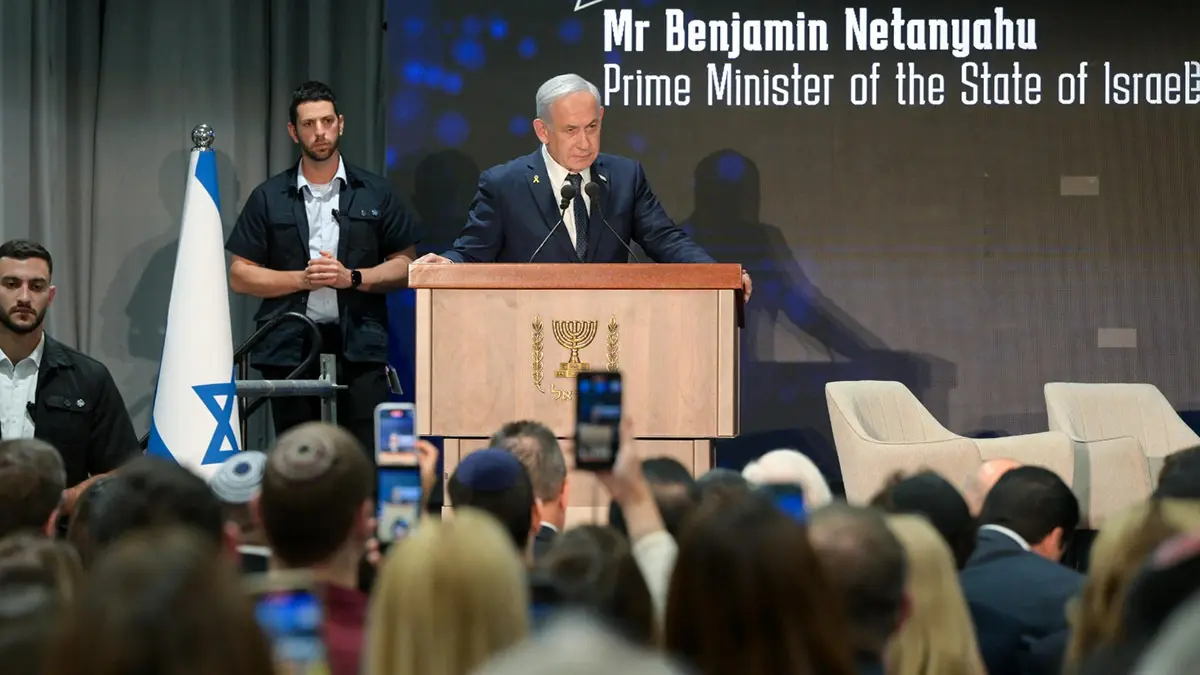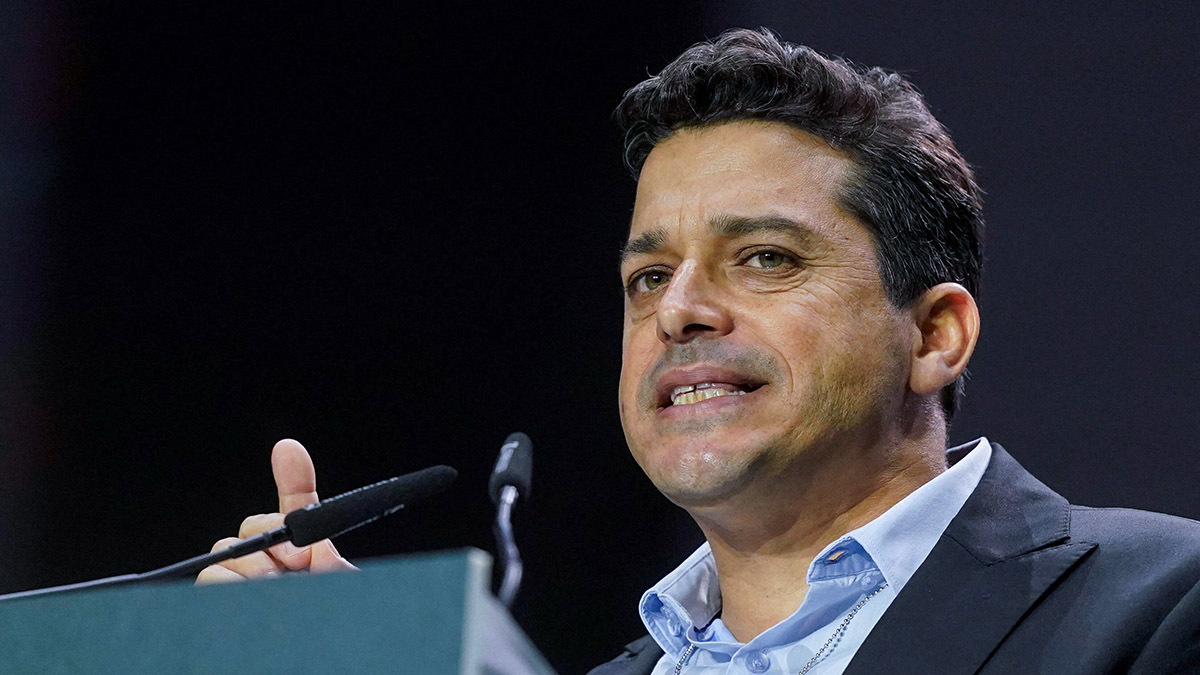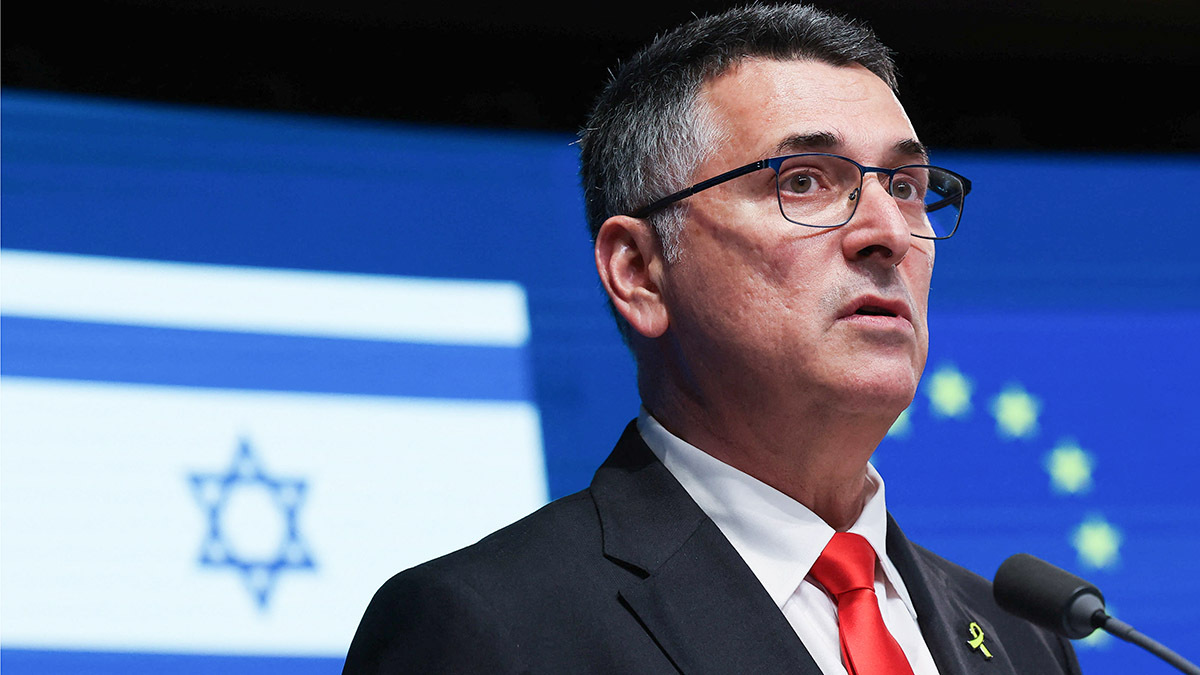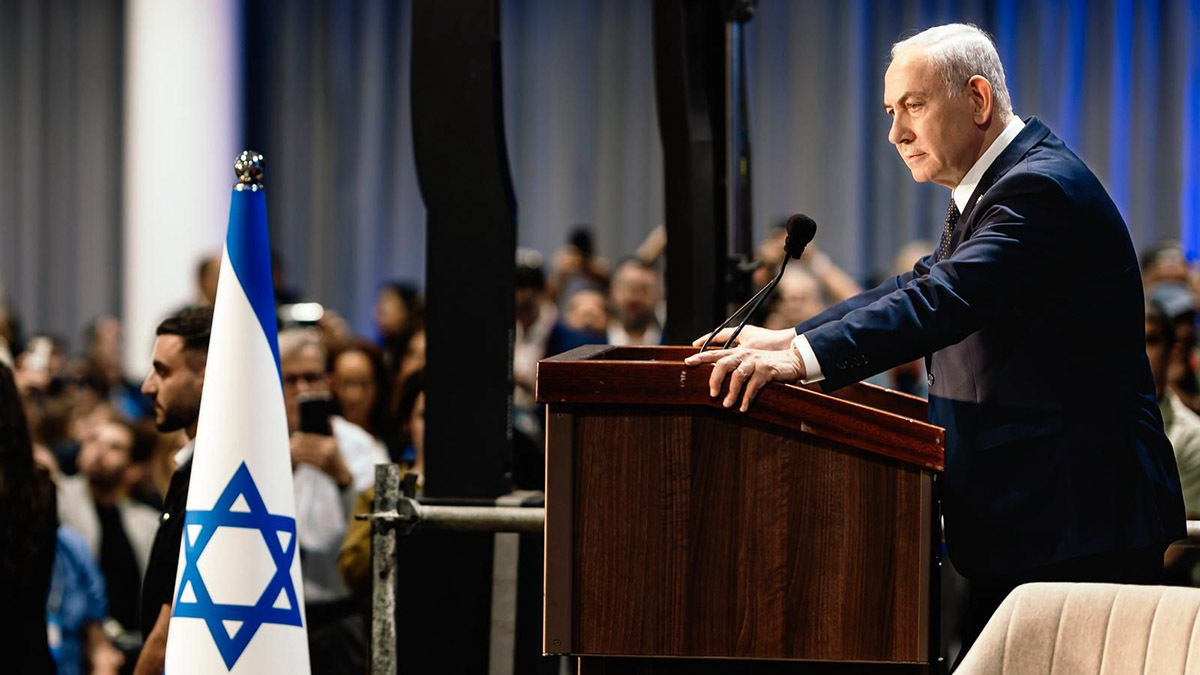Israel brings together political leaders at an international conference against anti-Semitism

- Political positions and controversial cancellations
- International measures and reactions against anti-Semitism
- Netanyahu warns of links between ‘the ultra-progressive left and radical Islamism’
- The importance of Arab-Israeli cooperation
- Europe and the resurgence of anti-Semitism
The Israeli Ministry of Diaspora and Fight Against Anti-Semitism organised the ‘International Conference to Combat Anti-Semitism’ in Jerusalem, an event that brought together international experts, activists and journalists to analyse the growing threat of anti-Semitism in the world.
Since the Hamas attack of 7 October 2023 and the subsequent war in Gaza, Jewish communities have experienced an alarming increase in anti-Semitic violence and hostility.
Among those attending were MEPs Jordan Bardella, Charlie Weimers and Kinga Gal. The event was opened by Amichai Chikli, Israeli Minister for the Diaspora and the Fight against Anti-Semitism, who emphasised the importance of raising awareness of the rise in anti-Semitism.

Political positions and controversial cancellations
During his speech, Chikli mentioned the invited MEPs and regretted that the conference had been subject to cancellations due to protests against the participation of far-right parties. The minister described these guests as ‘friends and allies’, criticising what he considers to be ‘defamations’ against him by those seeking to discredit Israel worldwide. According to Chikli, these allies understand the threat that radical Islam represents, not only to Jews, but to all of Western civilisation.
On the other hand, the minister lashed out at political and academic figures who, according to him, align themselves with ‘fanatical Islamists’. Among them he mentioned the Spanish President of the Government, Pedro Sánchez; Jean-Luc Mélenchon, leader of the French left-wing party La France Insoumise (LFI); Jeremy Corbyn of the UK and the UN secretary general, Antonio Guterres. Chikli accused them of representing ‘the moral collapse of the West’.
He also criticised European ministers who have travelled to Syria to meet with Ahmed Al-Sharaa, former leader of al-Qaeda in Syria. In this context, he stressed that the massacres perpetrated by Islamist extremists against minorities reflect ‘the great vision of radical Islam for humanity’, similar to what happened on 7 October.
בשבעה באוקטובר ההתקפה לא הייתה על גבולות ולא הייתה על שטח. זו הייתה אנטישמיות טהורה: שילוב של קנאות איסלאמית-רדיקלית עם דוקטרינות גזע נאציות. pic.twitter.com/0LUCF9WqCi
— עמיחי שיקלי - Amichai Chikli (@AmichaiChikli) March 27, 2025
International measures and reactions against anti-Semitism
Chikli praised former US president Donald Trump's decision to revoke student visas for those who support Hamas and Hezbollah, stating that the fight against anti-Semitism requires ‘concrete actions’.
Foreign Minister Gideon Sa'ar also participated in the conference, warning of a ‘new weapon’ used by radical Islamists: legal warfare. According to Sa'ar, these groups have resorted to international organisations such as the International Criminal Court, the International Court of Justice and the UN Human Rights Council in an attempt to ‘tie our hands’. In his opinion, instead of improving the world, these institutions have become ‘tools for the eradication of the Jewish state’.

Sa'ar also denounced a ‘disturbing alliance’ between the progressive far left and Islamist fundamentalism. According to him, Hamas and Hezbollah have been able to use these sectors and international organisations to promote their interests, which poses a threat not only to Jews, but to Western values as a whole. ‘What starts with the Jews never ends with the Jews,’ he warned.
Like Chikli, Sa'ar congratulated Trump for his policies on university campuses and urged Europe to fight more firmly against anti-Semitism. ‘The radical alliance that promotes this anti-Semitism must be fought with a firm hand,’ he concluded.
Thank you Foreign Minister @gidonsaar for taking the time to meet @MichaelWegier and me on @BoardofDeputies visit to Israel. Wide-ranging conversation on UK-Israel ties, releasing the hostages, defeating Hamas and Iran, fighting antisemitism, regional peace and security.
— Phil Rosenberg (@PhilR_R) March 28, 2025
🇬🇧🤝🇮🇱 pic.twitter.com/X9606LwKd0
Netanyahu warns of links between ‘the ultra-progressive left and radical Islamism’
Israeli Prime Minister Benjamin Netanyahu spoke at the conference to praise Trump for his ‘decisive actions against anti-Semitism’. He also blamed the protests at US universities against the war in Gaza as a manifestation of ‘a systemic alliance between the ultra-progressive left and radical Islamism’.
Israeli PM Benjamin Netanyahu:
— Eyal Yakoby (@EYakoby) March 28, 2025
"At MIT where I went to school, Harvard, and Columbia, and elsewhere, people are demonstrating with passion. Ignorant demonstrators. Who're they demonstrating for? These murderers, rapists, and mass killers? This is a reflection of a deep rot." pic.twitter.com/aiFR255UsL
Netanyahu defined anti-Semitism as ‘a disease carried by barbarians’ that affects all civilised societies and claimed that its resurgence is being driven by radical Islamists in Yemen, Iran, Lebanon and Gaza. ‘These anti-Semites not only want to destroy the Jewish state, but also modernity and drag the Arab and Muslim world into a primitive and violent medievalism,’ he declared.
The Prime Minister also highlighted Israeli military successes against Hamas, Hezbollah and the Houthis, pointing out that they have exposed ‘Iran's vulnerability’. According to him, Israel is transforming the Middle East and laying the foundations for a new future in the region.

The importance of Arab-Israeli cooperation
Within this regional future, Arab-Israeli cooperation is key, as reflected in the Abraham Accords, a platform that seeks to bring more countries on board, such as Saudi Arabia. Along these lines, former US ambassador to Israel David Friedman was ‘optimistic’ about relations between Riyadh and Jerusalem.
Was honored to speak this evening at Israel’s International Conference to Combat Antisemitism and to share a stage with @netanyahu pic.twitter.com/m8aN3rKeag
— David M Friedman (@DavidM_Friedman) March 27, 2025
Friedman also praised the United Arab Emirates for their fight against radical Islam, a position shared by Yemeni activist Luai Ahmed. ‘The Emirates show that there is hope in the Middle East,’ said Ahmed, recalling that as a child he was taught to hate Jews in mosques and schools, something that he says still happens in European countries like Sweden.
Europe and the resurgence of anti-Semitism
The rise of anti-Semitism in Europe was one of the key issues. Jordan Bardella, president of the French far-right party National Rally, linked this phenomenon to migration and Islamism. ‘Islamism is the totalitarianism of the 21st century and threatens to destroy everything that is not like it,’ he warned. According to Bardella, there is a link between the growth of Islamism, the resurgence of anti-Semitism and the migration crisis that is dividing Western societies.
Bardella highlighted the threats faced by Jews in France, recalling attacks against rabbis, people wearing Kippah and Jewish businesses. ‘All governments can be criticised, but Israel's right to exist cannot be called into question,’ he said.
Quand un rabbin est agressé dans les rues d’Orléans alors qu’il se promène avec son fils de 9 ans, toute la communauté nationale est bouleversée.
— Jordan Bardella (@J_Bardella) March 28, 2025
La seule réponse qui vaille, c’est la fermeté la plus totale de l’Etat pour protéger l’ensemble des Français. #Jérusalem pic.twitter.com/yoTgvgIvJJ
For his part, the former president of Paraguay, Horacio Cartes, expressed his concern about the ‘new anti-Semitism disguised as anti-Zionism’ that seeks to deny Israel's right to exist. Cartes presented himself as a ‘friend and ally’ of Israel and stressed that ‘there are moments in history when silence is not neutrality, but complicity’. In his opinion, Israel's cause is ‘the cause of freedom and the right of a people to exist in their own land’.
Felicitaciones a mi querido presidente del gran Partido Colorado @Horacio_Cartes por su participación en la Conferencia Internacional de Lucha contra el Antisemitismo, en Israel.
— Pedro Alliana (@AllianaPedro) March 27, 2025
Con este gesto, fortalecemos nuestra relación como países hermanos y reafirmamos el compromiso con… pic.twitter.com/1EY0mWztXz
Cartes concluded by recalling the numerous persecutions against Jews throughout history and stressed that hatred towards them is an indicator that ‘civilisation has lost its way’. ‘Jews have been humanity's moral thermometer,’ he concluded.








